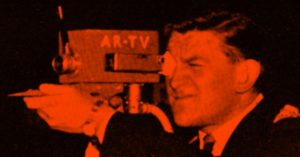The invisible two-headed racing driver and diplomat
What does a floor manager do?

“What does he do?” asked a visitor to Wembley, pointing to the calm floor manager on a studio floor. “Oh, he cues the actors,” said the visitor’s escort. “I see,” said the visitor politely, but obviously quite baffled. This article should help to paint a more accurate picture of the duties of a floor manager. It was written by assistant floor manager DAVID YALLOP, who describes it as a highly personalised opinion.

To some, the floor manager (F.M.) is a necessary evil, someone to be tolerated. Certain directors, for example, regard the relaying of instructions to an artist through the F.M. as not only irksome, but also (and this is particularly unfortunate) superfluous. To them it is a time-wasting operation. Why not, they reason, use the ‘mic’ to talk direct to the artist? When this belief is practised excessively, that’s when the time wasting really starts. The voice booms out but the instruction is not understood. It is repeated but still not understood. This is not because the artist is particularly unreceptive, it is usually because the director lacks a ‘mic’ technique. So eventually, the F.M. has to relay the instruction himself. What should have taken perhaps 20 seconds has taken a couple of minutes, and when you are on a tight schedule (as nearly always is the case), these minutes are precious. Once I recall nearly an hour being wasted in this way during one day’s rehearsal. That hour would have given the director another run of the play.
In some ways the F.M. is the invisible man of the studio crew. If he has done his job well there is little if any indication of it to the layman when the programme is transmitted. But if he has done his job badly, how it shows. A late cue may not only leave an actor with egg on his face, it can wreck that scene and the whole play. Failing to clear an actor who has a quick move can result in a beautifully composed shot of another actor talking to an empty chair. These are ordinary examples. There are more colourful ones.
Some years ago during a live transmission of a play, the F.M. had to make four quick cues in four different parts of the studio. Unknown to him, the lead from his ‘cans’ had become partially wound round his legs. He stood by at his first cueing point and duly cued action. As he moved to his second cueing point, the ‘can’ lead wound itself more tightly around his legs. By this time he realised what was happening but had no time to do anything about it. He duly gave the second cue and then just about managed to get himself in position for the third. Having given that, he was completely unable to move. The director cued for the fourth time but there was no response from the artist. This made the director slightly hysterical. He began screaming at the F.M. who, by this time, had fallen to the floor (to cue). Gamely he picked himself up and half-jumping, half-diving, the F.M. eventually gave the cue … in shot. Discretion prevents me from saying which company was transmitting the play, although the incident occurred before 1955.
Like all members of a studio crew, the efficient F.M. can be an enormous asset to a programme, often in subtle ways that are not obvious even to the rest of the crew. For example, many people fail to realise that there are many artists who have a distrust, if not a deep hostility, towards television in general and the studio crew in particular. An incident that illustrates this occurred last year during rehearsals for a play. The F.M. (himself an ex-actor) was chatting to a member of the cast with whom he had been in rep. Turning to the F.M., the artist waved his hand in the general direction of the studio crew and asked: “Are you with them or with us?”

This problem, although not generally recognised, is a very real one. The actor who feels like this may also believe that the cameramen are cold, unemotional fish whose only aim is to offer the director artistic or exciting and unusual shots. Obviously this is only one facet of the job of a good cameraman. One reason for this attitude could be that it is only in comparatively recent years that actors have been trained in television techniques. The older artist has had to acquire a technique by trial and error.
Just consider a few of the things an artist has to remember. There are many moves, for example, from set to set, key lights, voice projection, moves in relation to other actors and the cameras. In addition, he also has to remember his lines. No wonder there is distrust sometimes. Once recently an actress had to hit 12 different marks on the floor in one short scene. And then some genius remarked that her delivery appeared to be stilted. A F.M. must smooth the way and dispel this mistrust. But this is only the start. The artists should be protected and cocooned from the cares and worries of the studio. If this is not done his performance will certainly suffer. It is also an essential part of the F.M.’s duties to maintain discipline on the studio floor. It is equally important when occasion demands, to be ready with a joke or a remark to reduce the tension on the studio floor, for any TV production produces tension. If the people on the studio floor are not mentally relaxed occasionally during rehearsals, the recording will certainly suffer. It is not only the artists who ‘tighten up’ – the entire crew does as well. The ideal F.M. should have the reactions of a racing driver, the tact of a diplomat, the astuteness of a politician, a highly developed sense of humour, two heads, four arms and four legs. With all these gifts, he would still be found wanting by some. He should be able accurately to interpret the effect of any situation on the production. Besides relaying the situation to the director, he should also offer intelligent advice. He must be able to hold at least two conversations simultaneously.
It may be that his work is mainly intangible. However, it would be nice to think that the next time a visitor to our studios asks about the F.M., he can be given a little more information than ‘he cues the actors’.
About the author
David Yallop was a floor manager at Rediffusion



